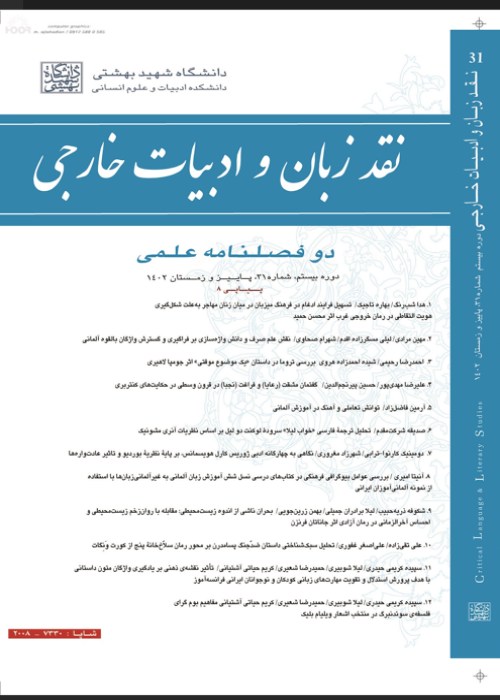The Co-extensiveness of Power and Resistance: A Foucauldian Reading of Howard Barker’s Victory
Author(s):
Article Type:
Research/Original Article (دارای رتبه معتبر)
Abstract:
Introduction
Since the late 1960s, Howard Barker’s theatre has occupied a significant position in British drama. During these years he has developed his own aesthetics in writing and performing his plays; naming it "the theatre of catastrophe". According to Barker "what lies behind the idea of catastrophe is the sense of other varieties of the self, repressed or obscured by politics, social convention or fear" (The Arguments 194). Accordingly, in his mature plays, including Victory, his oppressed characters try to (con)figure their "desire as an overwhelming impetus to action" for groping, "blindly but determinedly, towards self-reconstruction" (Megson 494). Background Studies: Among the researchers who have had sociopolitical look at Barker’s plays, Weissengruber has studied the concept of dystopia in the Western polity, especially on The Castle (1988). Hammond, also, has pointed to the notion of moving from socialism towards individualism in Victory, but he does not consider Foucault’s ideas about power and resistance (18-20). Moreover, Pennino highlights the impressions of staging Thatcher’s age in victory. He, also, touches slightly the concept of resistance in Victory without bringing Foucault’s ideas to the fore (110-115). Accordingly, the writer of the article tries to study the mechanism of power and resistance in the political behavior of characters in Barker’s Victory (1983) based on Foucault’s theories of power and resistance.
Methodology and Argument
Foucault’s theories of power/resistance can be, more or less, summarized around the two concepts of "co-extensiveness of power and resistance" and "subjectivization". Foucault emphasizes that during his career as a sociologist he has occupied himself with the ways western citizens have constituted "themselves as subjects under fixed and determinate condition" (Remarks 70). According to him, subjectivization is not the subjugation of the subject. Therefore, Foucauldian subjectivization refers to the subjects’ constitution of themselves in an active process of self-fashioning "even if this constitution is not possible in practice without also being constituted as a passive subject" (Kelly 88). Foucault also believes that "where there is power, there is resistance", but "this resistance is never in a position of exteriority in relations of power (The Will 95). In Victory, Susan Bradshaw’s attempts for collecting her puritan husband’s bones who is killed by Charles II’s soldiers is a symbol of resistance. Such endeavor while is seemingly useless represents the "co-extensiveness of power and resistance" in Victory. In this play, although Susan accepts that the period of her relieved reign is over, she continues to regain her new self while ignoring and welcoming all abuses. Susan, indeed, struggles for redefining her lost identity. Her strategies of resistance are, however, incorporated in power and make a new Susan out of her.
Conclusion
In this article, it was clarified that the Barkerian characters in Victory have to find their way towards redefining their subjectivities. A process which is named, in Foucauldian parlance, "subjectivzation", and emerges only in the "co-extensiveness of power and resistance". Such selffashioning, being passive and active at the same time, is a form of Foucauldian subjectivization. While Susan is successful in gathering her husband’s remnants, or perhaps parts of her identity, she enters the process of subjectivization and a new Susan is born. In contrast to Susan, Scrope and Ball decided not to resist but to fight against the system and ended in physically or mentally annihilation.Keywords:
Language:
Persian
Published:
Critical Language & Literary Studies, Volume:16 Issue: 22, 2019
Pages:
191 to 212
https://magiran.com/p2008818
دانلود و مطالعه متن این مقاله با یکی از روشهای زیر امکان پذیر است:
اشتراک شخصی
با عضویت و پرداخت آنلاین حق اشتراک یکساله به مبلغ 1,390,000ريال میتوانید 70 عنوان مطلب دانلود کنید!
اشتراک سازمانی
به کتابخانه دانشگاه یا محل کار خود پیشنهاد کنید تا اشتراک سازمانی این پایگاه را برای دسترسی نامحدود همه کاربران به متن مطالب تهیه نمایند!
توجه!
- حق عضویت دریافتی صرف حمایت از نشریات عضو و نگهداری، تکمیل و توسعه مگیران میشود.
- پرداخت حق اشتراک و دانلود مقالات اجازه بازنشر آن در سایر رسانههای چاپی و دیجیتال را به کاربر نمیدهد.
In order to view content subscription is required
Personal subscription
Subscribe magiran.com for 70 € euros via PayPal and download 70 articles during a year.
Organization subscription
Please contact us to subscribe your university or library for unlimited access!


